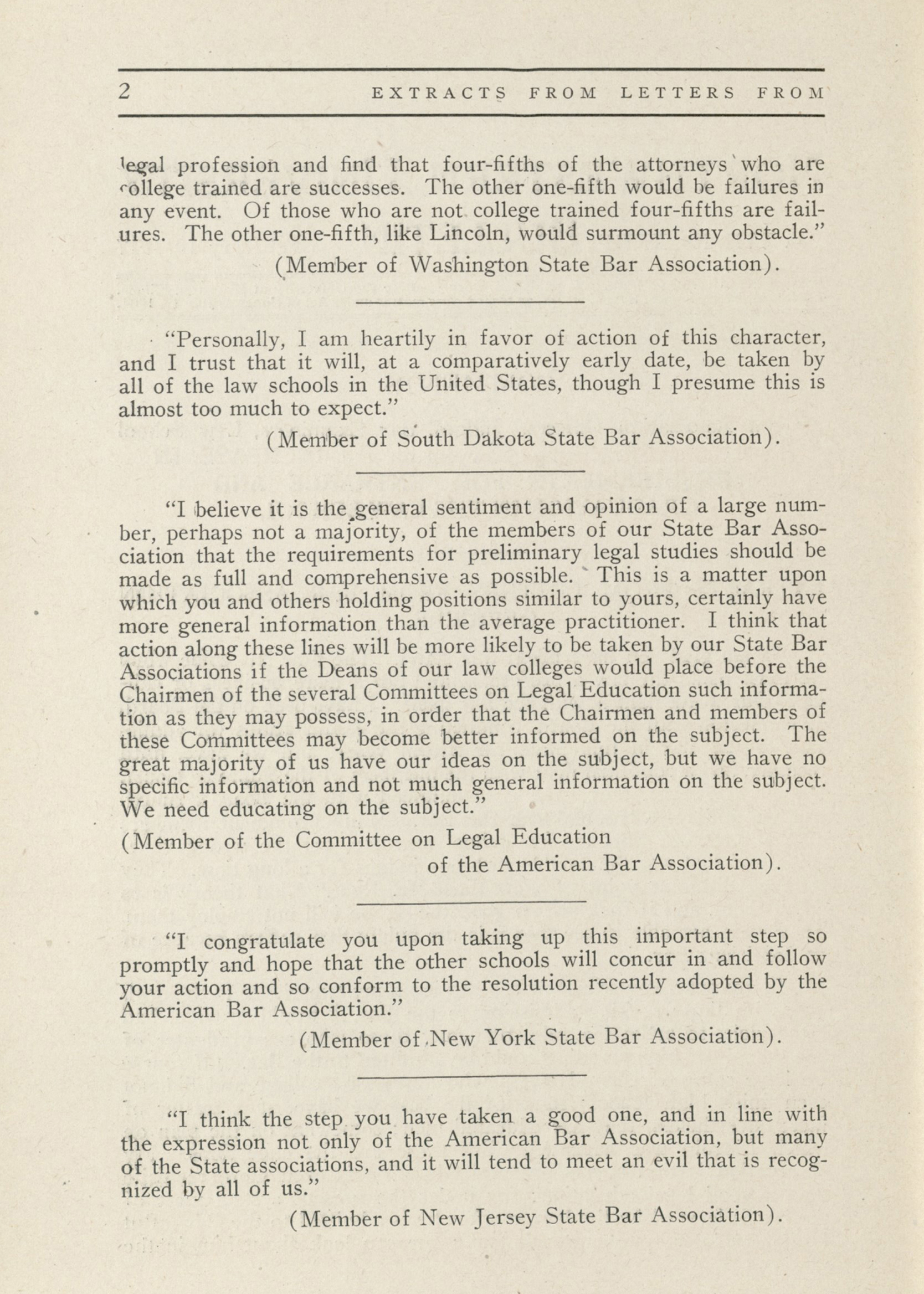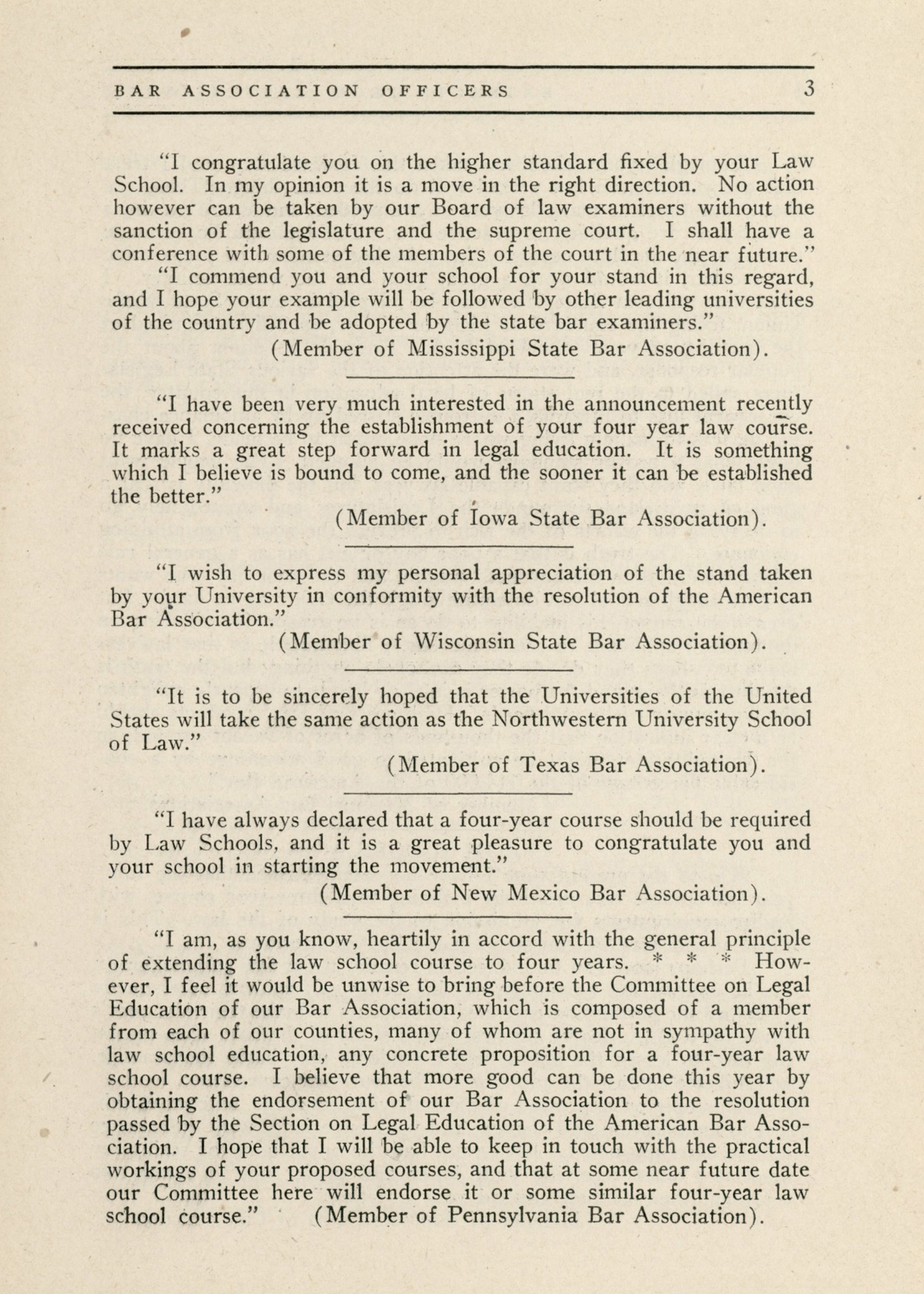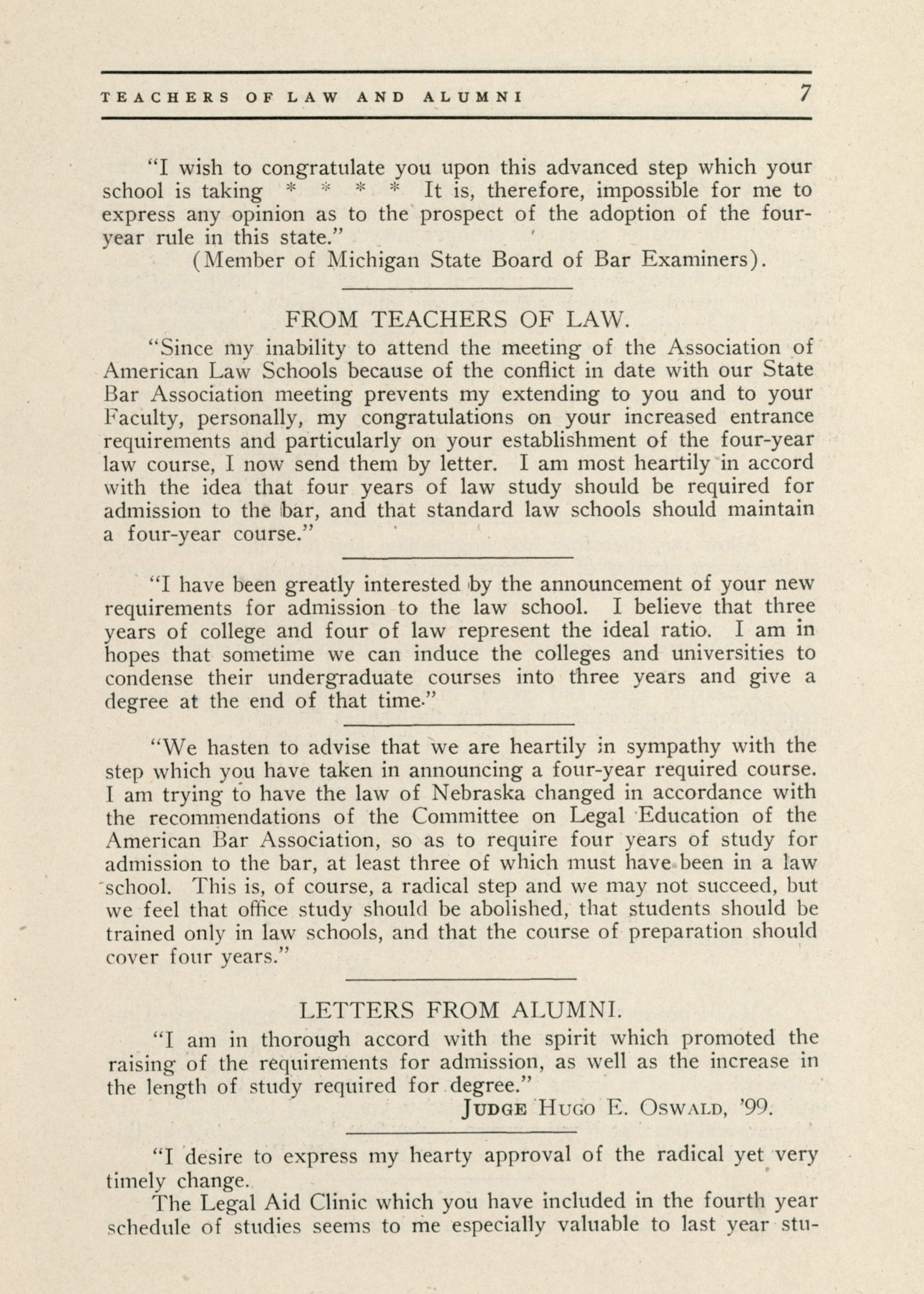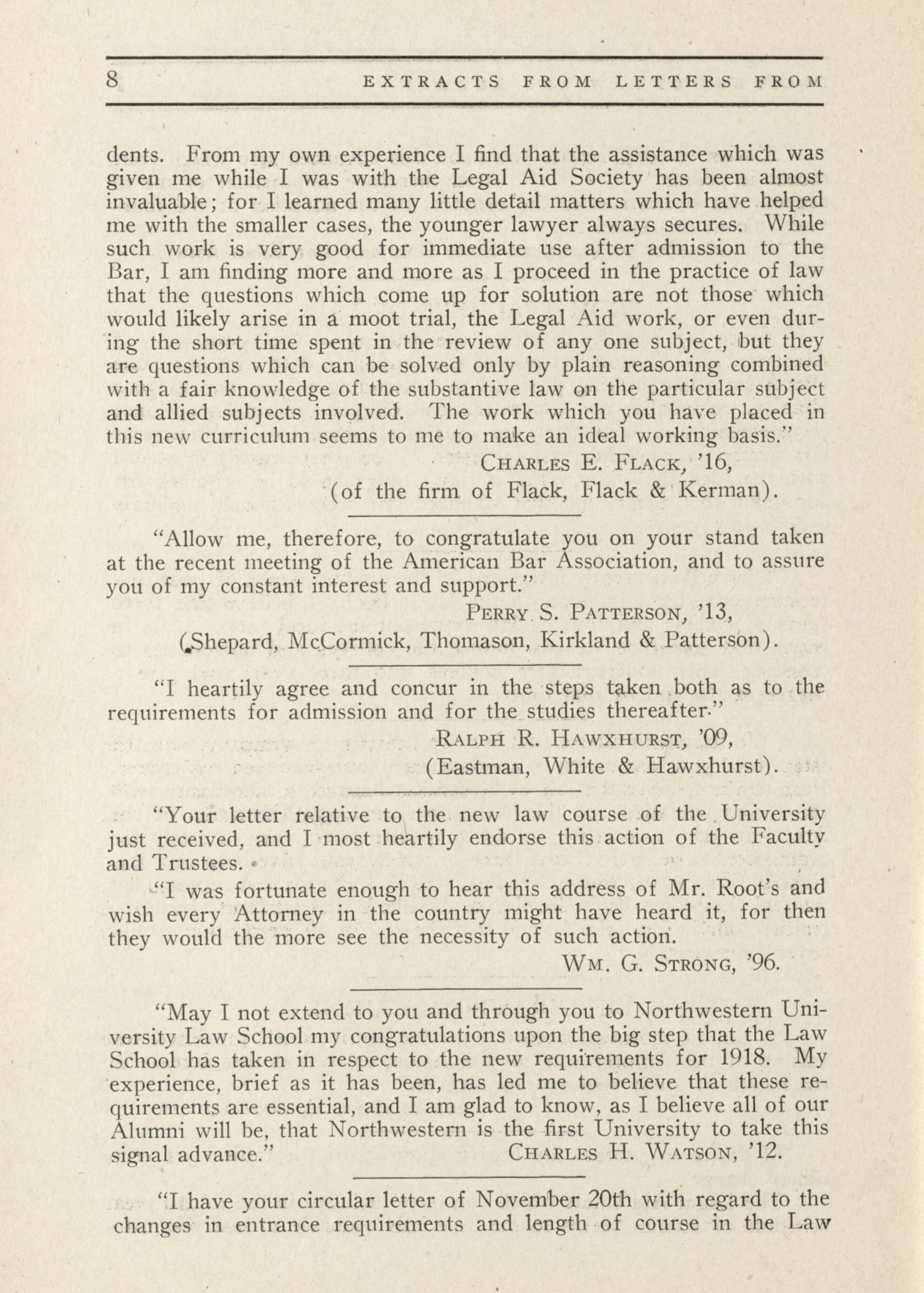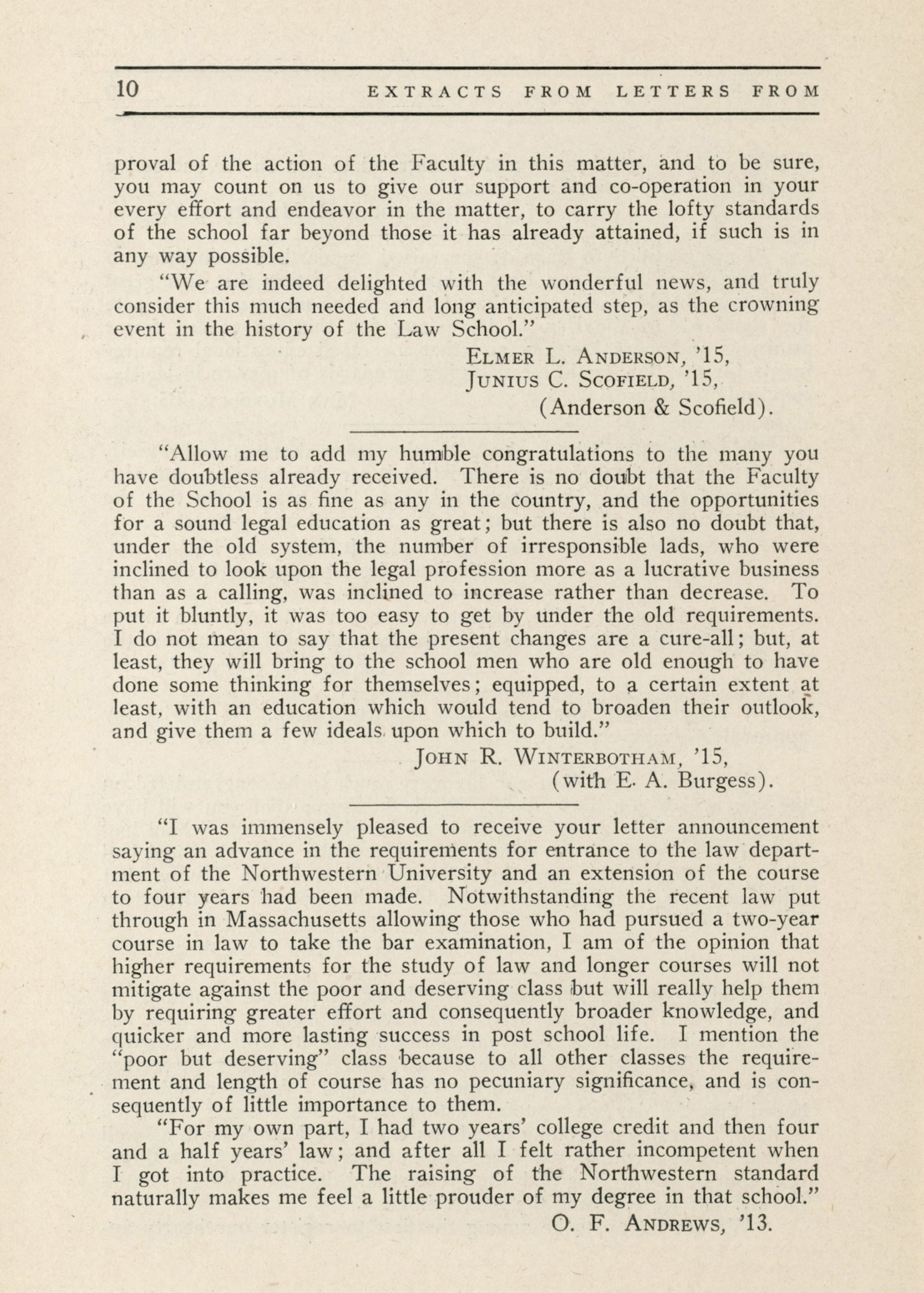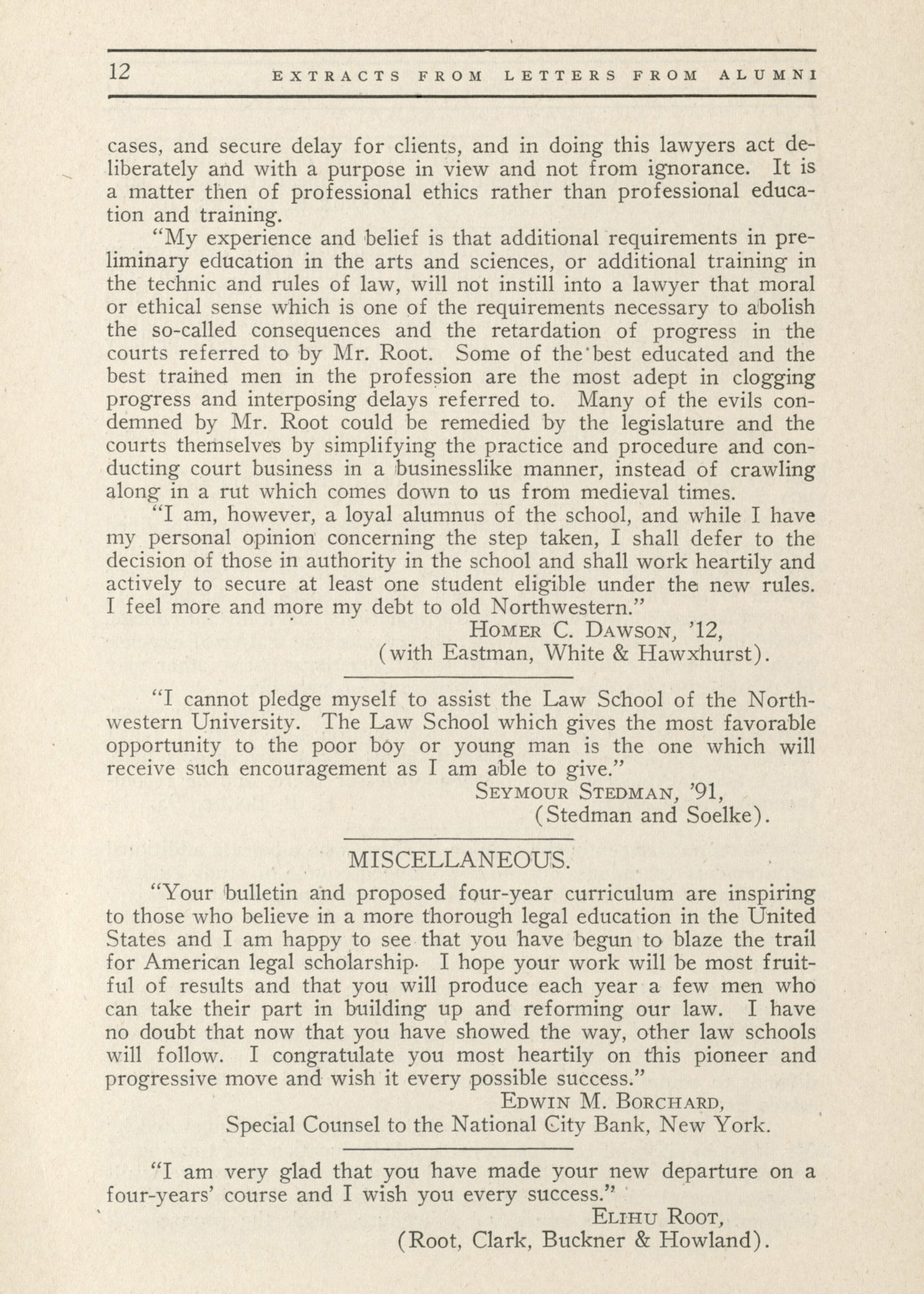Transcription of the Northwestern University Bulletin, 10 February 1917
NORTHWESTERN UNIVERSITY BULLETIN
Vol. XVII, No. XXIII February 10, 1917
Northwestern University Bulletin is published every week by the University at Evanston, Illinois.
Entered at the post office, Evanston, Ill., as second-class matter under Act of Congress July 16, 1904.
COMMENTS By Bar Association Officers, Judges, Bar Examiners, Law School Teachers and Practicing Lawyers on the INCREASE IN REQUIREMENTS FOR ENTRANCE AND GRADUATION IN THE LAW SCHOOL.
EXTRACTS FROM LETTERS FROM BAR ASSOCIATION OFFICERS.
”I am glad you have taken this stand. The time has come when we must make the law a profession and not a mere business or calling. Our worst fight is with the Bar itself. I have been on the Board, or connected with the Board, conducting the examinations for admission to the Bar in this State for fifteen years, and we have, until recently, had a continual fight with the members of the Supreme Court. Happily, however, they have all acquiesced with the Board’s ruling. But we still have trouble with the Bar. Many prominent members of the Bar, and who are law school men too, get the wrong viewpoint, and that was the trouble with our judges for a long time. They were of different point of view than Mr. Root. That theory is to admit them, and if they are no good the public will not employ them. They were not able to see that it is the public that suffers because of an inefficient Bar.
”I am not a law school man. But from my experience in the dealings with those seeking admission to the Bar, I would provide, had I the right to make the rule, that only those who are graduates of law schools of high standing could be admitted to the Bar. Of course we have some excellent lawyers who never saw college and did not even finish high school; some of the best we have, as a matter of fact; nevertheless, they are educated men; somewhat on the plan on
which Lincoln was educated. But those are the exceptions. My observation is that a good general education is even more requisite than a good legal education; for under the present system most of the law is learned by the lawyer after he is admitted to the Bar. But I often make the statement that any one can look about him in the legal profession and find that four-fifths of the attorneys who are college trained are successes. The other one-fifth would be failures in any event. Of those who are not college trained four-fifths are failures. The other one-fifth, like Lincoln, would surmount any obstacle.”
(Member of Washington State Bar Association).
”Personally, I am heartily in favor of action of this character, and I trust that it will, at a comparatively early date, be taken by all of the law schools in the United States, though I presume this is almost too much to expect.”
(Member of South Dakota State Bar Association).
”I believe it is the general sentiment and opinion of a large number, perhaps not a majority, of the members of our State Bar Association that the requirements for preliminary legal studies should be made as full and comprehensive as possible. This is a matter upon which you and others holding positions similar to yours, certainly have more general information than the average practitioner. I think that action along these lines will be more likely to be taken by our State Bar Associations if the Deans of our law colleges would place before the Chairmen of the several Committees on Legal Education such information as they may possess, in order that the Chairmen and members of these Committees may become better informed on the subject. The great majority of us have our ideas on the subject, but we have no specific information and not much general information on the subject. We need educating on the subject.”
(Member of the Committee on Legal Education of the American Bar Association).
”I congratulate you upon taking up this important step so promptly and hope that the other schools will concur in and follow your action and so conform to the resolution recently adopted by the American Bar Association.”
(Member of New York State Bar Association).
”I think the step you have taken a good one, and in line with the expression not only of the American Bar Association, but many of the State associations, and it will tend to meet an evil that is recognized by all of us.”
(Member of New Jersey State Bar Association).
”I congratulate you on the higher standard fixed by your Law School. In my opinion it is a move in the right direction. No action however can be taken by our Board of law examiners without the sanction of the legislature and the supreme court. I shall have a conference with some of the members of the court in the near future.”
”I commend you and your school for your stand in this regard, and I hope your example will be followed by other leading universities of the country and ·be adopted by the state bar examiners.”
(Member of Mississippi State Bar Association).
”I have been very much interested in the announcement recently received concerning the establishment of your four year law course. It marks a great step forward in legal education. It is something which I believe is bound to come, and the sooner it can be established the better.”
(Member of Iowa State Bar Association).
”I wish to express my personal appreciation of the stand taken by your University in conformity with the resolution of the American Bar Association.”
(Member of Wisconsin State Bar Association).
”It is to be sincerely hoped that the Universities of the United States will take the same action as the Northwestern University School of Law.”
(Member of Texas Bar Association).
”I have always declared that a four-year course should be required by Law Schools, and it is a great pleasure to congratulate you and your school in starting the movement.”
(Member of New Mexico Bar Association).
”I am, as you know, heartily in accord with the general principle of extending the law school course to four years. However, I feel it would be unwise to bring before the Committee on Legal Education of our Bar Association, which is composed of a member from each of our counties, many of whom are not in sympathy with law school education, any concrete proposition for a four-year law school course. I believe that more good can be done this year by obtaining the endorsement of our Bar Association to the resolution passed by the Section on Legal Education of the American Bar Association. I hope that I will be able to keep in touch with the practical workings of your proposed courses, and that at some near future date our Committee here will endorse it or some similar four-year law school course.”
(Member of Pennsylvania Bar Association).
”I am glad your school has taken this forward step, and I trust that every American law school will do the same thing. There are about four times as many lawyers as are needed, and about ten times as many as are qualified to practice law. Could the public be made to realize the absolute necessity for a higher standard of preparation for the bar, it would work a great good for the whole country. I trust that uniform State laws may be adopted in every State in the Union, fixing the standard as high, or higher, as will be required at the opening of your school in 1918. There is no doubt about the popular response, and were the attention of the various State Legislatures called to the real status of legal education in this country, the consequent loss to litigants, the trouble stirred up by ambulance chasing devices to make a living where none ought to be made, I have no doubt that a proper standard would be adopted. The people want good laws and they want capable lawyers, but the difficulty is that a gang of politicians surrounds the Legislatures and immediately go to decrying the efforts of the rich to prevent the poor from attaining eminence. The truth is that a poor boy or girl has as a general rule a better show than the boy with wealth and the poor boy who wants to go through school can do so, although the task may be hard. But even if he cannot, his inability to do so is no reason for allowing an unprepared applicant to reach the bar. The trouble is that lawyers move too slow; they decide they cannot do anything; but the truth is the duty is theirs and the power is in their hands to properly enlighten the community of its real needs. High costs of farm products should be a clear indication that the thousands of acres of vacant grounds in the United States might be cultivated to good advantage by a considerable percentage of the 114,000 of the American Bar.”
(Member of Missouri Bar Association).
FROM JUDGES.
”Up to the present time I have not been satisfied that the four-year law course was desirable, inclining to a three-year course, with higher requirements for admission to the study of the law. This is about as much as we can stand in the East at present.
Perhaps more can be induced to remain in our law schools for an M. L. course, the advantage of this being self-evident. Personally I deplore the permission extended to students to make their last year’s study for a B. A. degree the first year’s study of the law. The reason for this, to lessen the age at which students may begin the practice, will militate against the adoption of the four-year course.
This opinion expressed of the four-year course is, of course subject to modification and change, and your experience with this change will be carefully noted. I have not had the opportunity of seeing my associates since receiving your letter and prefer not to attempt to represent their attitude toward your question.”
(Member of Supreme Court of Connecticut).
”I am very glad to hear of the action that you have taken in regard to the four-year course. I cannot at this time say what the Court would think of the matter. It is just possible that the Legislature might listen to such a proposition.”
(Member of Supreme Court of North Dakota).
”I am glad to note that a University of your strength has come to the aid of the legal fraternity in this manner. In my opinion it is the solution of the present tendency to have too many lawyers of indifferent training.”
(Member of Supreme Court of North Dakota).
”I have read your editorial and Prof. Martin’s article and find myself entirely in accord with them, especially in regard to the addition of a fourth year to law school courses. I have often wished that I had taken a fourth year.”
(Member of Supreme Court of District of Columbia).
“While conceding the urgency for greater qualification of the prospective legal advocate and counsellor, the additional one year’s course suggested probably will not now receive the favor it deserves in West Virginia. Recently our requirements have been enlarged although against the protest to which Senator Root eloquently refers in the excerpts taken from his address delivered before the American Bar Association, August 30th of this year. Doubtless, when the people become reconciled to the advanced position already attained, another step may and necessarily will be taken, if other institutions having law departments such as Northwestern, Harvard and Yale lead the way.”
(Member of Supreme Court of West Virginia).
“I have received the announcement that Northwestern would inaugurate four years of study in preparation for the law. Let me congratulate you on this step.”
(Member of Court of Appeals of West Virginia).
FROM MEMBERS OF STATE BOARDS OF LAW EXAMINERS.
”I am pleased to note that you are making an effort to generally raise the standard for admission to the Bar. I wish we could succeed in accomplishing more in this line in the requirements or examinations before the various State Boards.”
(Member of Minnesota State Board of Law Examiners).
”Your change, I think, comes at the right time. I am told that the profession is more than ever crowded and that the best interests of the community at large require not more lawyers, but better lawyers.”
(Member of Massachusetts State Board of Bar Examiners).
”I am writing without having consulted with the other members of the Board, to say that I most heartily endorse this movement and know that our Board will be greatly pleased to hear of it, realizing that your influence in this direction will be felt and your example followed by other Universities.”
(Member of Kansas State Board of Law Examiners).
“I congratulate you on the courage shown in taking this forward step, and trust that other Universities, including our own, may see their way clear to follow your example.”
(Member of Minnesota State Board of Law Examiners).
“I am glad to see that your great University is doing so much to have future members of the Bar educationally qualified. Our Legislature has prescribed a course of either an Examining Board or the Supreme Court, and I think prolonged time of study. We may be able to do more in that direction at the next session.”
(Member of Louisiana State Board of Law Examiners).
”I am a member of the State Board of Bar Examiners and keenly interested in the matter specified in your letter. I fully realize the immediate necessity for additional requirements for admission to the bar of this State, but have no reason to believe that we can obtain at the hands of the Legislature at its January (1917) session the four-year rule. I hope to obtain, at least, some improvement as to the requirements for admission to the bar of this State. The argument we hear on every hand is that it matters little where a candidate for admission by examination may have received his knowledge of the law, if he demonstrates sufficient knowledge of the law to successfully pass our examinations. Again, it is said that one who possesses sufficient knowledge of the law to successft1lly pass our examinations, must, of necessity, possess a fundamental education on account of such fact. Both conclusions are erroneous in my judgment.”
(Member of New Mexico State Board of Bar Examiners).
”I wish to congratulate you upon this advanced step which your school is taking [….] It is, therefore, impossible for me to express any opinion as to the prospect of the adoption of the four-year rule in this state.”
(Member of Michigan State Board of Bar Examiners).
FROM TEACHERS OF LAW.
“Since my inability to attend the meeting of the Association of American Law Schools because of the conflict in date with our State Bar Association meeting prevents my extending to you and to your Faculty, personally, my congratulations on your increased entrance requirements and particularly on your establishment of the four-year law course, I now send them by letter. I am most heartily in accord with the idea that four years of law study should be required for admission to the bar, and that standard law schools should maintain a four-year course.”
”I have been greatly interested 1by the announcement of your new requirements for admission to the law school. I believe that three years of college and four of law represent the ideal ratio. I am in hopes that sometime we can induce the colleges and universities to condense their undergraduate courses into three years and give a degree at the end of that time.”
”We hasten to advise that we are heartily in sympathy with the step which you have taken in announcing a four-year required course. I am trying to have the law of Nebraska changed in accordance with the recommendations of the Committee on Legal Education of the American Bar Association, so as to require four years of study for admission to the bar, at least three of which must have been in a law school. This is, of course, a radical step and we may not succeed, but we feel that office study should be abolished, that students should be trained only in law schools, and that the course of preparation should cover four years.”
LETTERS FROM ALUMNI.
”I am in thorough accord with the spirit which promoted the raising of the requirements for admission, as well as the increase in the length of study required for degree.”
JUDGE HUGO E. OSWALD, ’99.
”I desire to express my hearty approval of the radical yet very timely change. The Legal Aid Clinic which you have included in the fourth year schedule of studies seems to me especially valuable to last year students. From my own experience I find that the assistance which was given me while I was with the Legal Aid Society has been almost invaluable; for I learned many little detail matters which have helped me with the smaller cases, the younger lawyer always secures. While such work is very good for immediate use after admission to the Bar, I am finding more and more as I proceed in the practice of law that the questions which come up for solution are not those which would likely arise in a moot trial, the Legal Aid work, or even during the short time spent in the review of any one subject, but they are questions which ca11 be solved only by plain reasoning combined with a fair knowledge of the substantive law on the particular subject and allied subjects involved. The work which you have placed in this new curriculum seems to me to make an ideal working basis.”
CHARLES E. FLACK, ’16,
(of the firm of Flack, Flack & Kerman).
“Allow me, therefore, to congratulate you on your stand taken at the recent meeting of the American Bar Association, and to assure you of my constant interest and support.”
PERRY S. PATTERSON, ’13,
(Shepard, McCormick, Thomason, Kirkland & Patterson).
”I heartily agree and concur in the steps taken both as to the requirements for admission and for the studies thereafter.”
RALPH R. HAWXHURST, ’09,
(Eastman, White & Hawxhurst).
”Your letter relative to the new law course of the University just received, and I most heartily endorse this action of the Faculty and Trustees.
”I was fortunate enough to hear this address of Mr. Root’s and wish every Attorney in the country might have heard it, for then they would the more see the necessity of such action.
WM. G. STRONG, ’96.
”May I not extend to you and through you to Northwestern University Law School my congratulations upon the big step that the Law School has taken in respect to the new requirements for 1918. My experience, brief as it has been, has led me to believe that these requirements are essential, and I am glad to know, as I believe all of our Alumni will be, that Northwestern is the first University to take this signal advance.”
CHARLES H. WATSON, ’12.
”I have your circular letter of November 20th with regard to the changes in entrance requirements and length of course in the Law School. This is good news, and I congratulate you on the successive advances made by our Law School.”
FRANK J. R. MITCHELL, ’99.
”I am gratified to learn of the raised standards of admission to and graduation from our Law School. It is fitting that this great institution should lead rather than follow in the movement to elevate the standards of the Bar. I have long felt that we needed fewer attorneys and more lawyers, and that increased educational requirements for the Bar would mean higher standards of service in legislation and judicature.”
MAX MURDOCK,’05.
“Mr. Hennings, who is also a Northwestern alumnus, and myself, read with great pleasure your important letter this morning, and also the several circulars which were enclosed. We assure you that the drastic change in policy has our hearty approval and support.”
ROY MALCOLM MCKERCHAR, ’16,
(with Peabody, Houghteling & Co.)
”I heartily endorse this, and am sure that it will never be a source of regret to either the University or the men who will graduate in the future.”
GEORGE H. GREAR, ’16.
”I congratulate you upon this important step. It merits my approval in every way.”
C. M. CLAY BUNTAIN, ’02.
”I certainly think that you are very much to be congratulated on the step which you have taken. While I assume that you will have some falling off in attendance, such as the Harvard Law School had when it first required the college degree, and the medical school had when it followed the same track, nevertheless I also assume that ultimately this is going to greatly add to the fame of Northwestern Law School.”
REDMOND D. STEPHENS, ’99,
(Scott, Bancroft, Martin & Stephens).
”Today we are in receipt of a letter from you informing us that our Alma Mater, for whom we have the deepest affection, has decided to inaugurate a four-year course for all students entering the portals of dear old Northwestern Law, and requiring a three-year college course for admission to the Law School. We have both long hoped that the day was not far distant when such changes would be made in the rules pertaining to admission to the Law School, as well as that the legal course would be made a four-year instead of a three-year course, and so it is with the greatest and deepest feeling of satisfaction that we welcome the glad tidings.
”We are happy to be among the first to register our hearty approval of the action of the Faculty in this matter, and to be sure, you may count on us to give our support and co-operation in your every effort and endeavor in the matter, to carry the lofty standards of the school far beyond those it has already attained, if such is in any way possible.
”We are indeed delighted with the wonderful news, and truly consider this much needed and long anticipated step, as the crowning event in the history of the Law School.”
ELMER L. ANDERSON, ’15,
JUNIUS C. SCOFIELD, ’15,
(Anderson & Scofield).
”Allow me to add my humble congratulations to the many you have doubtless already received. There is no doubt that the Faculty of the School is as fine as any in the country, and the opportunities for a sound legal education as great; but there is also no doubt that, under the old system the number of irresponsible lads, who were inclined to look upon the legal profession more as a lucrative business than as a calling, was inclined to increase rather than decrease. To put it bluntly, it was too easy to get by under the old requirements. I do not mean to say that the present changes are a cure-all; but, at least, they will bring to the school men who are old enough to have done some thinking for themselves; equipped, to a certain extent at least, with an education which would tend to broaden their outlook, and give them a few ideals upon which to build.”
JOHN R. WINTERBOTHAM, ’15,
(with E. A. Burgess).
”I was immensely pleased to receive your letter announcement saying an advance in the requirements for entrance to the law department of the Northwestern University and an extension of the course to four years had been made. Notwithstanding the recent law put through in Massachusetts allowing those who had pursued a two-year course in law to take the bar examination, I am of the opinion that higher requirements for the study of law and longer courses will not mitigate against the poor and deserving class but will really help them by requiring greater effort and consequently broader knowledge, and quicker and more lasting success in post school life. I mention the ”poor but deserving” class because to all other classes the requirement and length of course has no pecuniary significance and is consequently of little importance to them.
”For my own part, I had two years’ college credit and then four and a half years’ law; and after all I felt rather incompetent when I got into practice. The raising of the Northwestern standard naturally makes me feel a little prouder of my degree in that school.”
O. F. Andrews, ’13.
”I believe that the rules adopted will make the graduates of our Law School much more efficient and valuable members of the bar.”
VERNON R. LOUCKS, ’10.
“I have your letter of the 20th in regard to the new departure in connection with the Law Department of the University. I am very glad to see this. I do think that the Bar is having brought to it a very large number of men totally unfit on account of their early education, their legal education, and their moral perception, and especially is this the case among the foreign population.”
E. C. FERGUSON, ’80.
”I do not believe that you can get the standard too high, because the level should at least be paramount to all professions.”
TOM H. BUCKTHORPE, ’99.
”As to the point about securing desirable and properly qualified students from the colleges and universities, I wish to say that I think many would gladly apply to your Law School if their attention were drawn to the fact that there is such a good school in Chicago. As you know, many law students, after graduation from a distant college, would like to study law near home, not only for the matter of expense saving, but many other obvious reasons, as perhaps one’s father may be a lawyer, or he may have a prosperous business here.”
”In this connection, I will say as a matter of personal experience, that when I was in my last year at Princeton University, I felt I wanted to ask some one qualified to know about law schools here, and I asked President Wilson, then professor there, and he recommended Northwestern.”
H. B. BOGUE, ’95.
”I cannot concur in the opinion of those who advocate additional requirements for admission and a prolonged course of study such as is contemplated. First, because such requirements are not necessary to make good lawyers. I know a number of lawyers in Chicago who are first class but who have not had anywhere near the preliminary education or the training in law required by the new standards. The man who graduated at the head of my class in Northwestern and who had the best scholarship record, as I understand it, was a man with only a high school education. Second, because added restrictions and burdens will tend to keep men out of law school, and make it more difficult to comply with your request to the alumni to pledge themselves to secure students.
”Nor can I agree that the so-called consequences enumerated by Mr. Root in his brief are due to inadequate education and training of lawyers. In fact, most of the so-called consequences are not the result of ignorance or inefficiency on the part of lawyers, but the result of deliberate planning to ‘muss up’ procedure, block the progress of cases, and secure delay for clients, and in doing this lawyers act deliberately and with a purpose in view and not from ignorance. It is a matter then of professional ethics rather than professional education and training.
“My experience and belief is that additional requirements in preliminary education in the arts and sciences, or additional training in the technic and rules of law, will not instill into a lawyer that moral or ethical sense which is one of the requirements necessary to abolish the so-called consequences and the retardation of progress in the courts referred to by Mr. Root. Some of the best educated and the best trained men in the profession are the most adept in clogging progress and interposing delays referred to. Many of the evils condemned by Mr. Root could be remedied by the legislature and the courts themselves by simplifying the practice and procedure and conducting court business in a businesslike manner, instead of crawling along in a rut which comes down to us from medieval times.
”I am, however, a loyal alumnus of the school, and while I have my personal opinion concerning the step taken, I shall defer to the decision of those in authority in the school and shall work heartily and actively to secure at least one student eligible under the new rules. I feel more and more my debt to old Northwestern.”
HOMER C. DAWSON, ’12,
(with Eastman, White & Hawxhurst).
“I cannot pledge myself to assist the Law School of the Northwestern University. The Law School which gives the most favorable opportunity to the poor boy or young man is the one which will receive such encouragement as I am able to give.”
SEYMOUR STEDMAN, ’91,
(Stedman and Soelke).
MISCELLANEOUS.
”Your bulletin and proposed four-year curriculum are inspiring to those who believe in a more thorough legal education in the United States and I am happy to see that you have begun to blaze the trail for American legal scholarship. I hope your work will be most fruitful of results and that you will produce each year a few men who can take their part in building up and reforming our law. I have no doubt that now that you have showed the way, other law schools will follow. I congratulate you most heartily on this pioneer and progressive move and wish it every possible success.”
EDWIN M. BORCHARD,
Special Counsel to the National City Bank, New York.
”I am very glad that you have made your new departure on a four-years’ course and I wish you every success.”
ELIHU ROOT,
(Root, Clark, Buckner & Howland).


